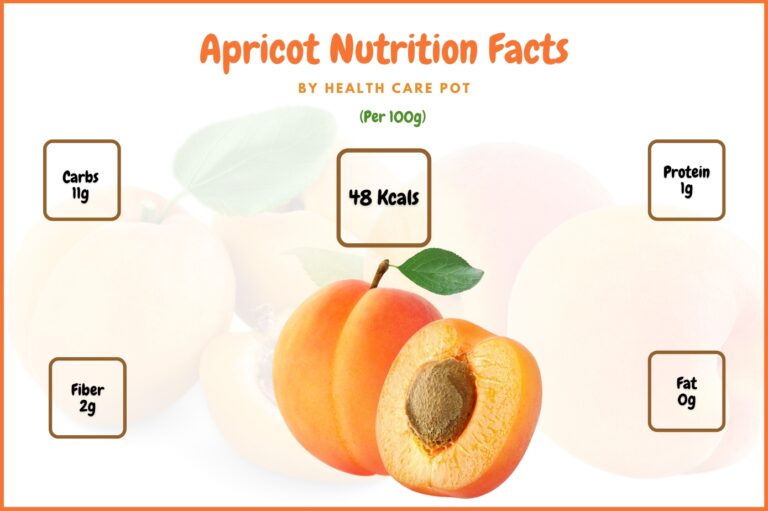Apricot is water-rich fruit. It has 86% water which means it belongs to low-calorie fruit. It has lots of health benefits; let's check it.
Apricots are native to China but mostly produced in Turkey (statics from 2022). The apricot's scientific name is 'Prunus Armeniaca'.
It is mostly used commercially for batteries and biofuels. It is also used in the pharmaceutical sector for making various medicines.
Apricot Nutrition Facts
Here below table shows the apricot's nutritional value per 100g.
Serving size 100 g
Servings per container 1 Calories from Fat 0 * Percent Daily Values are based on a 2,000 calorie diet. Your daily values may be higher or lower depending on your calorie needs.Nutrition Facts
Amount per serving
Calories 48
% Daily Value*
Total Fat 0g
0%
Saturated Fat 0g
0%
Trans Fat 0g
Cholesterol 0mg
0%
Sodium 1mg
1%
Total Carbohydrate 11g
4%
Dietary Fiber 2g
8%
Sugars 9g
Protein 1g
About 100 grams of apricot retains 48 Kcals, 0 grams of fat, 11 grams of carbohydrates, and 1 gram of protein.
There is no cholesterol or trans fat in the apricot. It holds just 1 mg of sodium.
Calories:
100 grams of apricot has 48 Kcals(201 kJ). It is low-calorie food because it includes 86% water. Most of the calories come from carbohydrates.
A 100-gram of apricot provides 11 grams of carbohydrates, 2 grams of fiber, and 9 grams of natural sugar. In 100 grams of apricot, Net carbs(Total Carbs-Fiber) should be 9 grams.
Apricot doesn't contain fat(or contains less than 0.5g of fat).
Apricot has 1 gram of protein per 100-gram serving.
Glycemic Index:
The glycemic index of apricot is between 34. It holds a low glycemic index.
Vitamins And Minerals In Apricot
Vitamines | Content | Minerals | Content |
|---|---|---|---|
Vitamin C | 10 mg | Calcium | 13 mg |
Vitamin A | 96 mcg | Phosphorus | 23 mg |
Vitamin E | 0.89 mg | Potassium | 259 mg |
Vitamin K | 3.3 mcg | Iron | 0.39 mg |
Vitamin B1 | 0.03 mg | Magnesium | 10 mg |
Vitamin B2 | 0.04 mg | Zinc | 0.2 mg |
Vitamin B3 | 0.6 mg | Copper | 0.078 mg |
Vitamin B6 | 0.054 mg | Manganese | 0.077 mg |
Vitamin B9 | 9 mcg |
100 grams of apricot provide Vitamin C(11%), Vitamin A(11%), Vitamin E(6%) and Vitamin K(3%) of your RDA(Recommended Dietary Allowances).
Vitamin C enhances immunity; Vitamin A helps your heart, lungs, and other organs to work properly; Vitamin E keeps healthy skin and eyes; and Vitamin K is necessary for blood clotting and healthy bones.
Apricot also has an adequate amount of B vitamins. 100 grams of apricot can contain Vitamin B1(thiamin) 2.5%, Vitamin B2(riboflavin) 3%, Vitamin B3(niacin) 4%, Vitamin B6 (pyridoxine) 4%, and Vitamin B9(folate) 2% of your RDA(Recommended Dietary Allowances). These vitamins require for digestion and proper nerve function.
Minerals are also needed for the body's health. Let's check its portion value.
100 grams of apricots have Calcium 1%, Phosphorus 1%, Potassium 13%, Iron 3%, Magnesium 2%, Zinc 2%, Copper 9%, and Manganese 3% of your RDA (Recommended Dietary Allowances).
Calcium helps our bones; Phosphorus plays a vital role in inventing DNA and RNA; Potassium commands fluid balance; Iron lowers tiredness and fatigue; Magnesium keeps muscle, nerve function, and energy production.
Zinc plays a significant role in building proteins; Copper makes red blood cells; Manganese supports the body in creating connective tissue, bones, and blood clotting factors.
Apricot Benefits
Apricot benefits for skin:
Apricot holds a good amount of vitamin C, E, and A. Vitamin C reduces skin aging, acne, and pimples. Vitamin E protects the skin from skin radicals. Vitamin A boosts the development of healthy new skin cells and supports skin solidity.
Apricot benefits for hair:
Apricot kernel oil reduces extra oil from the scalp and boosts hair development. This oil is the best nourishment for the scalp and hair.
Comment down your suggestions and queries in the comment section. We will love to hear from you.
Frequently Asked Questions(FAQ)
The best time to eat apricot is at breakfast and between meals.
Apricot contains a good amount of Vitamin C, E, and A that ultimately promotes the immune system.
Apricots are high in Vitamin C and Vitamin A.
Apricot is low in B vitamins and minerals. B vitamins and minerals are required for body growth and development

